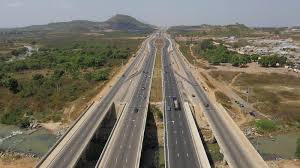Julius Berger Nigeria Plc is playing a central role in transforming Abuja’s infrastructure as the Federal Capital Territory continues to expand. Through strategic partnerships and key project executions, the construction giant is enhancing the city’s transportation systems, urban landscape, and overall economic development.
Speaking in a statement, the Regional Manager of Julius Berger Nigeria Plc, Mr. Oliver Berger, noted that the company’s work in Abuja dates back to 1980, when it began laying the foundation for large-scale development in partnership with the Federal Government.
“We are reshaping the infrastructural landscape in the Federal Capital Territory. Julius Berger has consistently delivered quality infrastructure that drives development and improves urban mobility,” he said.
Among the key projects listed by the company are several completed and ongoing initiatives including the Abuja-Kubwa Expressway, Abuja International Airport Runway, Central Bank of Nigeria building, Airport Road Interchange, and the rehabilitation of the International Conference Centre. Others are the Asokoro Hillside Multispeciality Hospital, Nigerian Upstream Petroleum Regulatory Commission’s new headquarters, residence of the Vice President, and emergency rehabilitation works at the FCT Minister’s residence.
One major highlight is the construction of Arterial Road N5 (Obafemi Awolowo Way)—a 4.4-kilometre infrastructure project designed to improve road connectivity and ease traffic. The project features multiple structural components such as box culverts, a river bridge, and a junction linking the N3/N30 roads. According to Berger, “work is progressing steadily, with each completed milestone bringing us closer to improving regional mobility.”
On the new Nigerian Upstream Petroleum Regulatory Commission (NUPRC) headquarters, designed by Artec Practice Limited, Berger stated that the structure is a landmark in modern architecture and engineering. “It represents innovation, efficiency, and world-class construction standards. From its sun-shielding façade to integrated building systems, it sets new standards in office design and functionality,” he added.
The company has also been pivotal in constructing critical road interchanges, including the Airport Road Interchange, which eliminated dangerous U-turns and eased traffic congestion. These modern traffic solutions have replaced outdated junction systems that were no longer sufficient for Abuja’s growing population and vehicle density.
Julius Berger’s interventions have significantly expanded Abuja’s arterial road network, enhancing mobility across districts and reducing transport bottlenecks. Notable contributions also include the Jabi Lake Bridge and the Nyanya-Karu Flyover, both of which have helped in reducing long-standing traffic problems.
One of the company’s most notable achievements is the construction of the Abuja-Kaduna Expressway and the Nnamdi Azikiwe International Airport access road, which have improved regional transportation efficiency and connectivity. These highways now serve as key transit routes for both commuters and logistics operators.
Beyond roads and bridges, Julius Berger has made remarkable contributions in building public institutions and national landmarks. The company has constructed several schools, hospitals, and government buildings, helping to create a more functional urban environment. Among its iconic structures are the Nigerian National Mosque and the Nigerian National Christian Centre, both of which reflect the firm’s ability to merge functionality with architectural beauty.
In health and education, the construction of modern hospitals and academic facilities by Julius Berger is aiding the delivery of quality public services. According to industry analysts, the company’s presence in Abuja goes beyond infrastructure—it’s about creating a functional, efficient, and visually appealing capital city.
Mr. Oliver Berger affirmed that quality, innovation, and long-term value continue to be the guiding principles for Julius Berger projects.
“With each new development, we are building not just structures, but sustainable systems that will serve generations. Our legacy in Abuja is built on trust, efficiency, and delivering beyond expectations,” he said.
As Abuja continues to grow rapidly, the role of reliable infrastructure becomes increasingly crucial. Experts say Julius Berger’s contribution is helping to future-proof the city, improve economic opportunities, and ensure that the capital remains well-planned and accessible.
